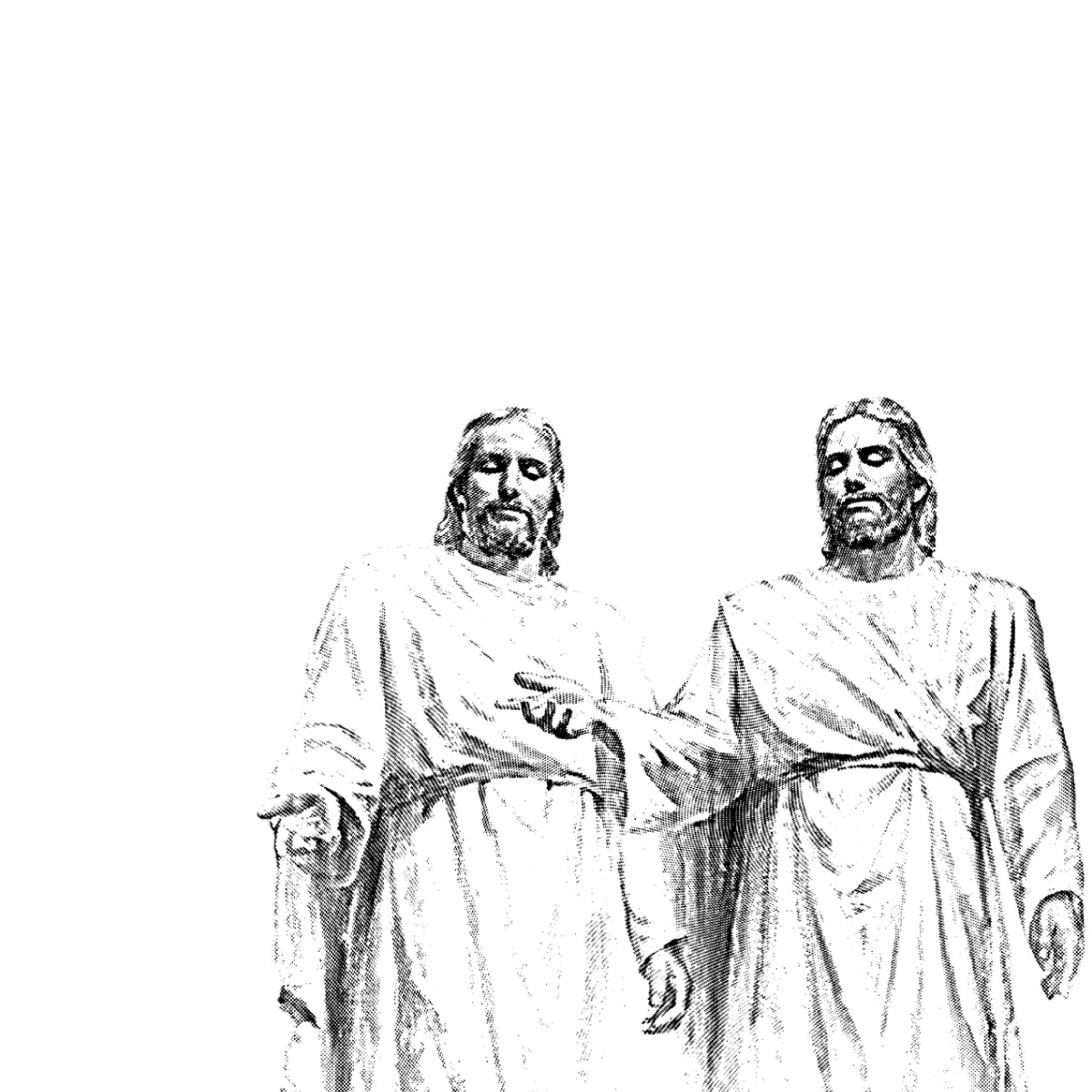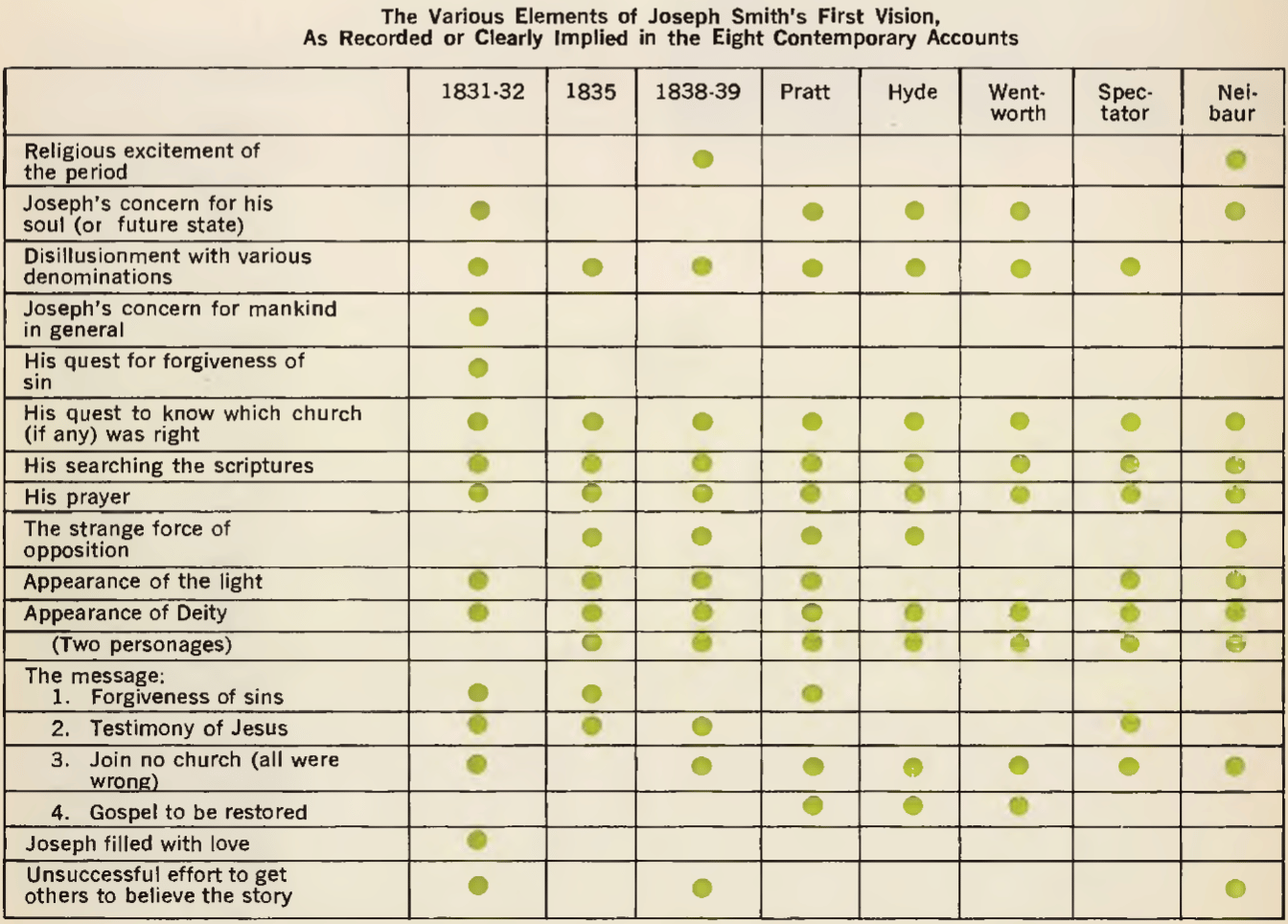Multiple Accounts of the First Vision

Did Joseph Smith give more than one account of the First Vision?
Yes. Joseph Smith[BIO] recorded five (known) firsthand accounts of his experience and gave one account to an interviewer.[1] Joseph also may have alluded to the First Vision in some of his early revelations.[2]
Date of Account | Context | Notable details |
Summer 1832 | The earliest known account and the only one in Joseph Smith’s handwriting. Written as a personal history. | Mentions seeing “the Lord,” but does not specifically mention two personages. It was edited to say Joseph was in his “16th year.”[3][4] |
November 9, 1835 | Joseph Smith's journal entry about a visit with Robert Matthews.[BIO] Scribed by Warren Parrish.[BIO] | Describes seeing two “personages,” with one appearing soon after the other, and “many angels” when he was about 14. First mentions opposition while praying.[5][6] |
Nov 14, 1835 | Joseph Smith's journal records a visit with Erastus Holmes.[BIO] Scribed by Warren Parrish. | Brief reference to the "first visitation of Angels" that Joseph experienced when he was “about 14.”[7] |
1838–1839 | Part of a history of Joseph Smith’s life intended for publication. The earliest extant copy was scribed by James Mulholland.[BIO] | Mentions two personages and no angels. One personage points to the other and says, “This is my beloved Son.” This is the official, canonical version.[8][9] |
1842 | Times & Seasons editorial titled “Church History” published by Joseph Smith. | Mentions “two glorious personages who exactly resembled each other.” Originally intended to be published in a history book.[10][11] |
Sept 15, 1843 | David Nye White[BIO] interviews Joseph Smith for the Pittsburgh Weekly Gazette. | Mentions two personages, one appearing soon after the other, with the first saying, “Behold my beloved Son.”[12] |
1844 | In He Pasa Ekklesia, Israel Daniel Rupp[BIO] prints account of vision provided by Joseph Smith. | Near word-for-word retelling of the 1842 account, including “two glorious personages who exactly resembled each other.”[13] |
Why did Joseph give different accounts of his vision?
Joseph's accounts of the First Vision were addressed to different audiences under different circumstances.[14]
Okay, but are the differences important?
Maybe. Joseph’s accounts differ slightly, emphasizing different aspects and varying in some details.
1832[15] | 1835[16] | 1838-39[17] | 1842[18] | |
How old was Joseph? | “in the 16th year of my age”[19] | “I was about 14” | “between fourteen and fifteen years of age” | “about fourteen years of age”[20] |
What did Joseph think of churches at the time? | “they did not adorn their profession by a holy walk and Godly conversation . . . mankind did not come unto the Lord but that they had apostatised from the true and liveing faith and there was no society or denomination that built upon the gospel of Jesus Christ” | “looking upon at the different systems taught the children of men, I knew not who was right or who was wrong” | “the seemingly good feelings of both the Priests and the Converts were mere pretence more pretended than real . . . my mind became somewhat partial to the Methodist sect . . . for at this time it had never entered into my heart that all were wrong” | “there was a great clash in religious sentiment . . . if God had a church it would not be split up into factions” |
Why did Joseph go to pray? | “I become convicted of my sins . . . I cried unto the Lord for mercy for there was none else to whom I could go and to obtain mercy” | “I knew not who was right or who was wrong and concidering it of the first importance that I should be right, in matters that involved eternal consequences; . . . information was what I most desired at this time, and with a fixed determination to obtain it, I called upon the Lord for the first time” | “My object in going to enquire of the Lord was to know which of all the sects was right, that I might know which to join.” | “if I went to one society they referred me to one plan, and another to another . . . considering that all could not be right, and that God could not be the author of so much confusion I determined to investigate the subject more fully” |
Did Joseph read James 1:5? | — | “I retired to the silent grove and bow[e]d down before the Lord, under a realising sense that he had said (if the bible be true) ask and you shall receive knock and it shall be opened seek and you shall find and again, if any man lack wisdom let him ask of God who giveth to all men libarally and upbradeth not;” | “I was one day reading the Epistle of James, First Chapter and fifth verse which reads . . .” | “Believing the word of God I had confidence in the declaration of James; ‘If any man lack wisdom let him ask of God . . .” |
Did something try to stop Joseph? | — | “my toung seemed to be swolen in my mouth . . . I heard a noise behind me like some person walking towards me . . . I sprung up on my feet, and and looked around, but saw no person or thing that was calculated to produce the noise of walking” | “I was siezed upon by some power which entirely overcame me and had such astonishing influence over me as to bind my tongue . . . Thick darkness gathered around me and it seemed to me for a time as if I were doomed to sudden destruction.” | — |
Who appeared in the vision? | “the Lord opened the heavens upon me and I saw the Lord” | “a personage appeard in the midst, of this pillar of flame which was spread all around, and yet nothing consumed, another personage soon appeard like unto the first” | “I saw two personages (whose brightness and glory defy all description) standing above me in the air.” | “saw two glorious personages who exactly resembled each other in features, and likeness” |
What was Joseph told in the vision? | “Joseph my son thy sins are forgiven thee. go thy way walk in my statutes and keep my commandments . . . the world lieth in sin and at this time and none doeth good no not one they have turned asside from the gospel and keep not my commandments . . . I come quickly as it [is] written of me in the cloud clothed in the glory of my Father” | “thy sins are forgiven thee, he testifyed unto me that Jesus Christ is the son of God;” | “One of them spake unto me calling me by name and said (pointing to the other) ‘This is my beloved Son, Hear him.’ . . . I was answered that I must join none of them, for they were all wrong . . . all their Creeds were an abomination in his sight, that those professors were all corrupt . . . He again forbade me to join with any of them and many other thing[s] did he say unto me which I cannot write at this time.” | “They told me that all religious denominations were believing in incorrect doctrines, and that none of them was acknowledged of God as his church and kingdom. And I was expressly commanded to “go not after them,” at the same time receiving a promise that the fulness of the gospel should at some future time be made known unto me.” |
Did Joseph see angels? | — | “and I saw many angels in this vision”[21] | — | — |
How did people react? | “could find none that would believe the hevnly vision” | — | “one of the Methodist Preachers . . . treated my communication not only lightly but with great contempt . . . telling the story had excited a great deal of prejudice against me among professors of religion” | — |
The basics of the story in the different accounts are the same: as a young man, Joseph prayed to God and had a divine vision. In that vision, he saw deity and was given a commission.[22]
But why would Joseph say angels visited in one of the accounts instead of God?
It's unclear. It's possible he was being purposely vague. This vague account was recorded by Joseph's scribe when an ex-Methodist named Erastus Holmes[BIO] visited Joseph, asking about the Church.[23]
The week before, Joseph had shared a very detailed account of the First Vision with a visitor named Robert Matthews, who said he was a Jewish minister.[24] Joseph later learned that Matthews was not who he claimed to be, but was instead a notorious domestic abuser, fraudster, and possible murderer.[25] After this negative experience, Joseph may have decided to be less open with Erastus Holmes.
However, it's also possible that Joseph was using "angels" as a generic term for deity.[26]
Aren’t these inconsistencies evidence that he made the First Vision up?
Probably not. If Joseph Smith made it up with the intent to defraud then he would probably have a memorized, well-rehearsed story, and every version would be identical.[27]
But if Joseph was a prophet, wouldn't God have helped him tell his experience perfectly each time?
Probably not. Prophets don't have perfect recall, and apparently, God is okay with this.[28]
Did any of Joseph Smith’s peers give reports of the vision?
Yes. A handful of individuals gave secondhand accounts of the vision while Joseph Smith was alive and claimed they heard the account from Joseph.[29] Others alluded to hearing it from Joseph.[30] There are also thirdhand accounts[31] and later reminiscences from people who claimed they heard about the vision from Joseph.[32]
Did those secondhand accounts match up with Joseph’s accounts?
Overall, yes. However, some conflated details of the First Vision with Moroni’s visits to Joseph.[33]
Were accounts of Joseph’s vision ever published and circulated during his lifetime?
Yes. In 1842, the Church's newspaper, the Times & Seasons, published both the letter for John Wentworth and Joseph’s 1838 history.[34] A non-Latter-day Saint publication later republished the Wentworth Letter account in 1844.[35] Some missionary tracts in the early 1840s also recounted the First Vision in great detail.[36]
Why did Joseph wait so long to record his vision?
When Joseph had the vision, he was a poor writer.[37] There are no known examples of his writing before 1829.[38][39] One of the first things he did write was his account of the First Vision.[40] He required a scribe when translating the Book of Mormon, and Emma reported that he could barely write at the time.[41]
Related Question
Did Joseph Smith really only have a third-grade education?
Read more in Joseph Smith's Pre-1830 Education
Couldn’t he have asked someone else to write it for him?
Probably. However, Joseph said that the few people he shared the vision with reacted with unbelief and hostility.[42] It seems he mostly kept the vision to himself until he was older and had people around him that he trusted and could share his experiences with.[43]
Is it true that no other Church leaders ever talked about Joseph’s vision until decades after it purportedly happened?
No, not really. Two different apostles published accounts of the vision during Joseph’s lifetime for use in missionary efforts.[44] In the 1850s and 1860s, several Church leaders gave sermons referencing the First Vision.[45]
However, Church curriculum was developing throughout the 1800s and early 1900s,[46] so it's difficult to determine how frequently leaders referenced the First Vision.
Did the Church try to keep the multiple accounts of the First Vision a secret?
No, not really. In the Church's official centennial history, edited by B. H. Roberts in 1930, the 1838 and 1842 accounts of the First Vision were harmonized and cited.[47]
After Paul Cheesman[BIO] documented the 1832 First Vision account in 1965,[48] follow-up publications in places like BYU Studies,[49] the Improvement Era,[50] and the Ensign,[51] as well as Church CES publications,[52] openly discussed the different First Vision accounts or drew from material in the different accounts.
In the April 1970 edition of the Improvement Era, a synoptic chart comparing the different historical accounts of the First Vision was published:[53]

But didn't Joseph Fielding Smith hide the 1832 account from the public by locking it up?
Possibly. There is circumstantial evidence that Joseph Fielding Smith may have intended to keep the 1832 account private. The account was torn out from the letterbook it was originally written in at some point between 1930 and 1965.[54] Amateur historian LaMar Petersen[BIO] recounted a meeting with Elder Levi Edgar Young[BIO] during the 1950s in which Young made mention of a "strange account" of the First Vision that was "unused, unknown"[55] and "concealed for 120 years in a locked vault."[56] The details of the "strange account" seem to match Joseph Smith's 1832 account of the First Vision.[57]
This has led some to argue that Joseph Fielding Smith[BIO] (who was Church Historian and Recorder at the time)[58] had the account locked away from public eyes.[59]
- Robert G.
“Paul told his story of meeting Jesus on the road to Damascus 3 times in Acts 9, 22, and 16, and the details differ from one account to the next.” - Jake
“Personally, I don't think the differences between the 1832 and 1838 accounts can be reconciled. It may be explainable that Joseph emphasized different aspects of the vision at different times, but how did he forget why he prayed in the first place?” - Spencer P.
“It makes sense to my mind that there would be several accounts. It also makes sense that these accounts would be slightly different from each other, all be it the important details consistent. Anyone telling a story of their own can relate to this.” - Larry J.
“It was important to me that one of the 1st words that Christ told Joseph was that his sins were forgiven. That Joseph was filled with love and compassion, and that those feeling lasted several days.” - Jackson
“In my struggles with faith and church history, I'm glad at least this one thing doesn't bother me.”



 about this topic
about this topic